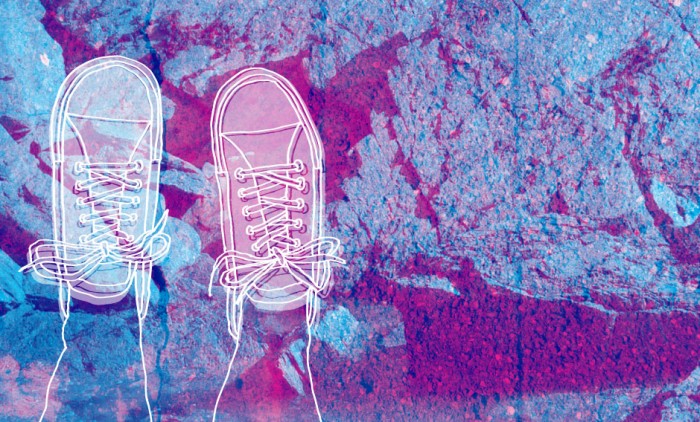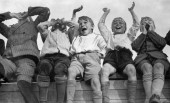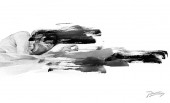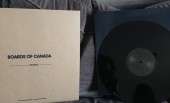I really wanted to be able to write a cynical and hateful piece about how all of the Warp artists that formed the musical underpinning of my teens had turned into greedy, lazy slobs. I wanted to explain how the millenial heroes of experimentalism I used to worship had become as staid and tired as anything they had implicitly critiqued with their weirdness. I really wanted to be cool and hateful. I had a pun and everything.
But sadly, Tomorrow’s Harvest, the first release from Boards of Canada in a very long time, is kind of brilliant. It doesn’t tread much new ground, it just takes a few textures and motifs, stretches them out, and then shifts them into a series of glitched grooves. It’s formulaic to some extent, and it’s built entirely on the past, but then they always were. Part of the charm of Boards of Canada has always been that their work sounds like something that has been dug up, lost in archive or irradiated.
Tomorrow’s Harvest welcomes you in with a ’70s corporate ident and then morphs into haunted visions of barren wastelands. If you haven’t connected with it yet, listen to it on a train. It is built on that mix of movement and stasis that you can only feel on a long journey, staring at a landscape that is always moving but never changes. The video for teaser track ‘Reach for the Dead’ is just a barren desert passing by, viewed from the passenger seat of a car. It is the obvious choice.
It is the sort of album that makes you want to write short stories about post-soviet Europe, abandoned council estates or a melancholy artificial intelligence. It is the sort of album that makes you a little bit scared. It is the sort of album that probably makes a lot of people fall asleep, and not necessarily in a good way. It is a significant improvement on Campfire Headphase, which was at least an attempt to breaking new ground for the band (and inspired the likes of Bibio and Solar Bears to take similar motifs in some intriguing directions).
No, it’s not as perfect as ‘Turquoise Hexagon Sun’; but you may as well complain about an album not being as bright as the sun, as six sided as a hexagon, or as turquoise as a universe in a blender.
It still technically fits my critique, so I guess I’ll present it anyway. I was a teen during what I consider to be the Warp heyday. Just after it branched out from relatively straightforward techno and acid house, and before it branched into Maximo Park. We’re talking when Aphex Twin and Squarepusher pounded your head in every direction at once, when Two Lone Swordsmen and Plaid were slightly more discotheque-ready but in very different ways, when Jamie Liddell had yet to forget to correctly mash his soul into weird little pieces, when Clark still had a Chris, and was just a twinkle in the terrifying eyes of that first album cover compared to his current output.
I like to think that ‘Windowlicker’ was the ‘Good Vibrations’ of my generation, a pocket symphony of experimentation, tearing down the walls between conventional pop and something huger and more expansive. Not that my generation is a legitimate corporate entity, with a capacity for internal agreement. To be honest I think that ‘Good Vibrations’ was actually my ‘Good Vibrations’, because it was still around and still as engagingly ridiculous as it always was. The ability to record sound is pretty cool like that.
I do remember hearing Feed Me Weird Things and thinking that the music I knew was having the rug pulled out from under it. I remember the excitement about the release of Drukqs, and the initial confusion of having to parse what sounded like three different albums on shuffle at the same time. I remember spending hours on end arguing about who was better, Aphex or Squarepusher (my eventual conclusion was that Aphex was a better ‘composer’ and Squarepusher was a better ‘player’, proving that I am actually slightly less pretentious than I used to be, which I guess is a win).
Since then, though, most of these producers have collapsed into an obvious pattern. Plaid have remained exactly the same, releasing the same record time and again, once every five years. Squarepusher vaults between his own arse and attempting to steal the thunder of yesteryear, steadily releasing but only reliably producing the pretentious explanations that I still secretly hang from. Aphex doesn’t release anything, but is probably making a fortune from a steady drip feed of re-issues. Two Lone Swordsmen have gone their lone ways, Keith Tenniswood making excellent techno and Andy Weatherall continuing to produce excellent music for other people. Clark is the only one who still feels like he’s really pushing envelopes. His last album was a surging beauty, strange and different, and obviously built on the present rather than the past.
At least, that’s the narrative I want to present.
I just don’t think it’s true though. Aphex can still freak people out but he doesn’t need a mask, he just waited until someone gave him complete control of an orchestra. Squarepusher is actually still making great music. Plaid have done two excellent soundtracks, and I’ve seen them do at least one incredible bassmusic set. Even that summary of Two Lone Swordsmen didn’t sound convincingly snooty, because it was basically a pair of compliments.
And Boards of Canada have just released a record that has all of the laidback charm of Campfire Headphase, the haunting weirdness of Geogaddi, and only just falls short of the simply beautiful songs of Music has the Rights to Children.
In truth, I can’t make my argument stick because I know at its core is the peril of nostalgia. I remember music having its rug stolen from underneath it because I was a teenager, and so my own rug was being whipped away at the same time. Everything was more important. Everything was my first time. Everything was an implosion of sensation and experience. Everything was blurred and scattered and intensified by hormones, drugs or alcohol, depending on the time of day.
I had my ground shattered by the musical giants of my teenage days just as kids today are probably having their own broken by everything they hear. The youth of today are swimming in dubstep, grime, funky and no end of things pitched so precisely at the mobile phone speaker output that I am probably incapable of hearing them with my aging, beleaguered eardrums. And in the same way that the Beach Boys blew my mind, I expect some of them are right this second hearing ‘Windowlicker’ for the first time, or ‘Good Vibrations’, or ‘Octopus’s-bloody-Garden’, and having their minds stoved in by it.
There is a lot of incredible music out there, and the children are swimming in it. Music has the rights to them, and it always will.
Don’t sit there trying to find a new way to complain about the supposed insipidness of a new old thing, just remember how intense it felt, and try and let the music channel a little of that intensity back into you. Even now, the first time I hear something incredible is often the closest I can get to feeling like a teenager and having my expectations blown. Don’t just rely on nostalgia for your thrills, find something new.
And if you can’t be bothered, at least listen to the new Boards of Canada record, it might just remind you who they used to be, and who you used to be too.
Words: Alex Allsworth
Illustration: Emma Charleston





Follow us
Follow us on Facebook Follow us on Twitter Follow us on Google+ Subscribe our newsletter Add us to your feeds